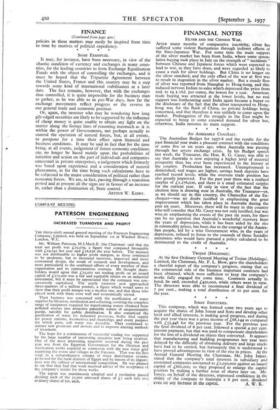SOME EXAMPLES.
It may, for instance, have been necessary, in view of the chaotic condition of currency and exchanges in many coun- tries, for the leading countries to form Exchange Equalisation Funds with the object of controlling the exchanges, and it must be hoped that the Tripartite Agreement between the United States, France and this country may be a step towards some kind of international stabilisation at a later date. The fact remains, however, that with the exchanges thus controlled, it is quite impossible for the business man to gather, as he was able to in pre-War days, how far the exchange movements reflect progress or the reverse in our general trade and economic position.
Or, again, the investor who may be wondering how long gilt-edged securities are likely to be supported by the influence of cheap money is quite unable to obtain any light on the matter along the former lines of reasoning inasmuch as it is within the power of Governments, not perhaps actually to control the operation of natural forces, but, at all events, to postpone for a time their effect upon financial and business conditions. It may be said in fact that for the time being, at all events, judgement of future economic conditions can no longer be based mainly upon the probabilities of initiative and action on the part of individuals and companies concerned in private enterprises, a judgement which formerly was based upon experience and a consideration of natural phenomena, as for the time being such calculations have to be subjected to the major consideration of political rather than economic forces. We are, in fact, passing through a transition period and at present all the signs are in favour of an increase in, rather than a diminution of, State control.
ARTHUR W. KIDDY.










































 Previous page
Previous page